duet
Brahms ― Sonata, Op.120 No.1 ― Alto Flute
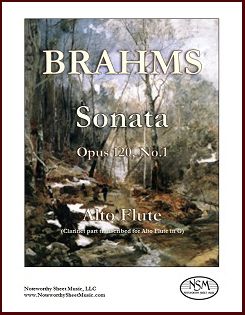 Sonata, Op.120 No.1, by Johannes Brahms
Sonata, Op.120 No.1, by Johannes Brahms
Transcribed for Alto Flute by J.W.Pratt
Alto Flute Part, PDF $8.99
Although written originally for clarinet, Brahms himself created two more versions of his Op.120 sonatas, for violin and viola. John W. Pratt, who transcribed these works for alto flute so expertly, writes in his foreword: "If Brahms was happy with versions for clarinet, viola, and violin, surely he would have welcomed arrangements for alto flute, especially since it is the mellow rather than the clarion aspect of the clarinet that he called on. In making our arrangements for alto flute, the violin versions have been particularly helpful, since the violin has the same lower range as the alto flute, but they required modification for several reasons. One, of course, is that the alto flute cannot play as loudly at the bottom of its range as the violin can. Another is that Brahms gave the violin double stops even though the clarinet is limited to a single voice." Our editions of the two Op.120 sonatas include only the alto flute parts, as Brahms' piano scores are freely available in the public domain. Here is a link to the listing of Op.120 No.1 on IMSLP.org, where the clarinet, viola, and violin versions with piano scores may be found. Our alto flute arrangements are based on the usual piano parts that accompany the clarinet as the solo instrument. The entire transcription of Op.120 No.1 works remarkably well, but the breathtakingly beautiful slow movement played on alto flute will steal your heart away.
Alto Flute part, 9 pages; Total 14 pages.
PreviewBrahms ― Sonata, Op.120 No.2 ― Alto Flute
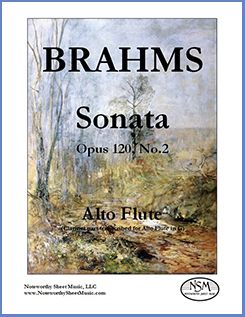 Sonata, Op.120 No.2, by Johannes Brahms
Sonata, Op.120 No.2, by Johannes Brahms
Transcribed for Alto Flute by J.W.Pratt
Alto Flute Part, PDF $8.99
This is the second of Brahms' two clarinet sonatas, transcribed for alto flute by John Pratt. Although written originally for clarinet, Brahms himself created two more versions of his Op.120 sonatas, for violin and viola. Mr. Pratt, who transcribed these works for alto flute so expertly, writes in his foreword: "If Brahms was happy with versions for clarinet, viola, and violin, surely he would have welcomed arrangements for alto flute, especially since it is the mellow rather than the clarion aspect of the clarinet that he called on. In making our arrangements for alto flute, the violin versions have been particularly helpful, since the violin has the same lower range as the alto flute, but they required modification for several reasons. One, of course, is that the alto flute cannot play as loudly at the bottom of its range as the violin can. Another is that Brahms gave the violin double stops even though the clarinet is limited to a single voice." Our editions of the two Op.120 sonatas include only the alto flute parts, as Brahms' piano scores are freely available in the public domain. Here is a link to the listing of Op.120 No.2 on IMSLP.org, where the clarinet, viola, and violin versions with piano scores may be found. Our alto flute arrangements are based on the usual piano parts that accompany the clarinet as the solo instrument.
Alto Flute part, 8 pages; Total, 12 pages.
PreviewBriccialdi - Fantaisie pour la Flûte - Fl & Pf
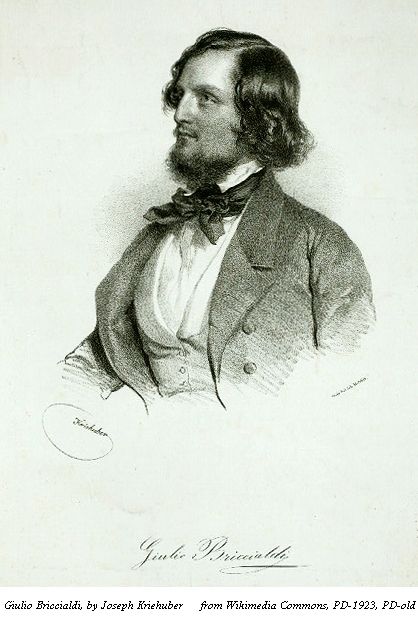 Fantaisie pour la Flûte, Op.110, by Briccialdi
Fantaisie pour la Flûte, Op.110, by Briccialdi
Gassett Collection - Facsimile Edition by C.A.Vater/Noteworthy Sheet Music
Flute Part and Piano Score, PDF $13.50
The virtuoso Italian flutist Giulio Briccialdi (1818-1881) was a captivating performer and a brilliant and prolific composer of works for the flute. His compositions became highly popular among flutists and include several concerti and numerous duets, caprices, fantasies, and etudes. He served as professor of flute at the Academy of St. Cecilia in Rome and later at the Florence Conservatoire. A proponent of the Boehm flute, Briccialdi is best known today for his invention of the Briccialdi B-flat thumb key and for his variation on the Carnival of Venice, "Il Carnevale di Venezia" (Op.78). We offer here our facsimile edition of his charming, challenging, and otherwise unavailable Fantaisie pour la Flûte sur des motifs de l'opera La Sonnambula de Bellini (Op.110).
For additional information about the Gassett Collection, please see see our article An Introduction to the Gassett Collection.
Piano score, 13 pages; Flute part, 5 pages; Total 23 pages.
PreviewBridge – 4 More Short Pieces – Flute or Alto Flute (and Piano)
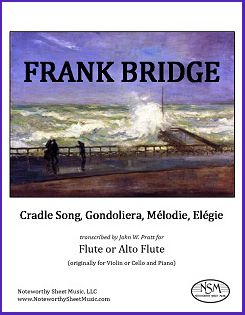 Cradle Song, Gondoliera, Mélodie, and Elégie, by Frank Bridge
Cradle Song, Gondoliera, Mélodie, and Elégie, by Frank Bridge
Transcribed for Flute or Alto Flute (and Piano) by J. W. Pratt
Flute Part, Alto Part, PDF $11.99
Like the 4 Short Pieces for Violin and Pianoforte published in transcription by Noteworthy Sheet Music previously, these additional four short pieces by Bridge "provide a fine and delightful introduction to an accessible post-romantic composer who should be better known." Published by Bridge between 1903 and 1911, the works included in our second edition are transcriptions of Cradle Song, written for violin or cello and piano, Gondoliera for violin and piano, and Mélodie and Elégie for cello and piano. Mr. Pratt has created transcriptions of all four pieces for both flute and alto flute, and we include both instrument versions in this combined edition. We think Cradle Song and Elégie are particularly beautiful on the alto flute, but all are effective on either instrument, so we prefer to let our flutists decide on which instrument they choose to play each piece. We provide our flute and alto flute parts only; the original piano scores work well with our transcriptions and are available, along with the violin and cello parts, as free pdf downloads at imslp.org—click the links to access the scores for Cradle Song, Gondoliera, Mélodie, and Elégie.
Flute part, 6 pages; Alto Flute part, 6 pages; Total, 14 pages.
PreviewBridge – 4 Short Pieces – Flute or Alto Flute (and Piano)
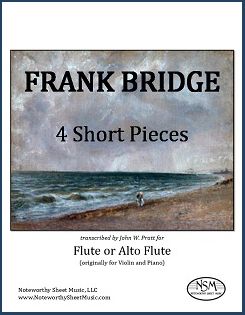 4 Short Pieces, by Frank Bridge
4 Short Pieces, by Frank Bridge
Transcribed for Flute or Alto Flute (and Piano) by J.W.Pratt
Flute Part, Alto Part, PDF $8.99
The 4 Short Pieces by Frank Bridge were written for violin and piano, and first published in 1912. As noted in John Pratt's foreword to the edition, they "provide a fine and delightful introduction to an accessible post-romantic composer who should be better known." The pieces are Meditation, Spring Song, Lullaby, and Country Dance. Mr. Pratt has created transcriptions of the violin parts for both flute and alto flute, and we include both instrument versions in this edition. We think Nos. 1 and 3 sound particularly nice on the alto flute and No. 4 is a splendid romp on the C flute, but all four are effective on either instrument, so we prefer to let our flutists decide on which instrument they choose to play each piece. We provide only our flute and alto flute transcriptions; the piano score, including the original violin part, is available as a free pdf download at imslp.org.
Flute part, 5 pages; Alto Flute part, 5 pages; Total, 14 pages.
PreviewBridge – Two Pieces: Pensiero and Allegro appassionato – trans. for Clarinet and Piano
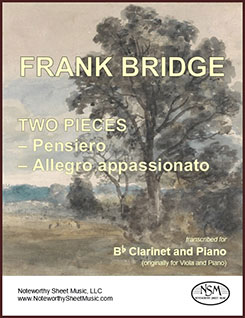 Two Pieces: Pensiero and Allegro appassionato, by Frank Bridge
Two Pieces: Pensiero and Allegro appassionato, by Frank Bridge
Transcribed for B-flat Clarinet and Piano by C.A.Vater
Score and Part; PDF $10.99
Certain chamber works written for viola can also work very beautifully when transcribed for clarinet, and indeed may actually be coveted by clarinetists. Brahms’ Two Songs for Voice, Viola and Piano, Op. 91 is one such piece, and our transcription has become one of NSM’s most popular publications. Clarinetists may discover that our adaptation of the viola part of Frank Bridge’s Two Pieces: Pensiero and Allegro appassionato, written for viola and piano, is also well-conceived and enjoyable to play. As suggested by their titles, these two pieces were written in very different styles, but they complement each other well, showing off Bridge’s composing versatility and providing performers an opportunity to display a range of emotions and capabilities. In our edition, we have raised the Pensiero key from F minor to G minor, taken a few passages in both pieces 8va to bring them into clarinet range, and created clarinet-friendly adaptations for the viola’s occasional double stops, but otherwise the pieces remain as Bridge composed them.
Score, 10 pages; Clarinet part, 3 pages; Total, 16 pages.
PreviewBurleigh - Southland Sketches, Nos. I, III, IV - Alto Flute or Flute (& piano)
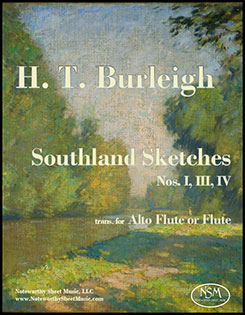 Southland Sketches, Nos. I, III, IV, by H. T. Burleigh
Southland Sketches, Nos. I, III, IV, by H. T. Burleigh
Transcribed for Alto Flute or Flute (and piano) by C. A. Vater
Alto Flute part and Flute part, PDF $9.96
Harry Thacker Burleigh was an acclaimed African-American singer, music editor, and composer whose adaptations of African-American spirituals became famous. His Southland Sketches, which were composed for violin and piano and published by G. Ricordi in 1916, are a fine example of Burleigh’s quintessential American style. The original composition included 4 movements. Our edition excludes the second movement, but adapts three of the original four miniatures for either alto flute or flute. We provide only the transcribed alto flute and flute parts, as they have been designed to work well with the piano part in the original score for violin and piano which is available as a good quality, free pdf download from imslp.org. Performers may choose to play all three of these pieces on either flute or alto flute, or switch instruments between sketches, depending on personal preference.
Alto Flute part, 6 pages; alternate Flute part, 6 pages; Total,18 pages. (pdf of piano accompaniment is freely available at imslp.org)
PreviewCoste - Cavatine - Afl + Pf
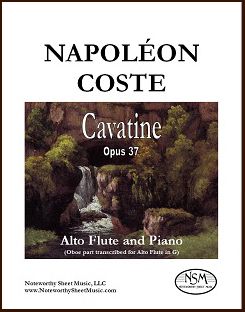 Cavatine, Op.37, by Napoléon Coste
Cavatine, Op.37, by Napoléon Coste
Transcribed for Alto Flute and Piano by C.A.Vater
Piano Score and Alto Flute Part, PDF $8.25
Napoléon Coste (1805-1883) was born in a small village in the Départment of the Doubs, France. He began to play guitar at the age of 6, studying with his mother who was an accomplished guitar performer. Napoléon himself began teaching and performing on guitar as a teenager. At age 24 he moved to Paris, where he studied under Fernando Sor, the renowned Spanish classical guitarist and composer. Coste quickly established himself as a virtuoso and is widely acknowledged as the dominant French guitarist of his era.
Coste became famous not only as a guitar soloist, but also as a major composer of some 60 works, most of which were written for guitar. His Op.37 "Cavatine" is a short, single-movement piece composed for piano and oboe (or violin or flute). The work is lovely, melodic but lively in places; it falls nicely within the range of the alto flute and sounds appealing and completely natural on that instrument. The Noteworthy Sheet Music edition includes a score for piano and alto flute, in addition to the transcribed alto flute part.
Alto Flute part, 3 pages; Piano Score, 8 pages; Total, 16 pages.
PreviewCoste - Les Regrets - Afl or Fl (or Ob, Vn) and Pf (or Guitar, Harp)
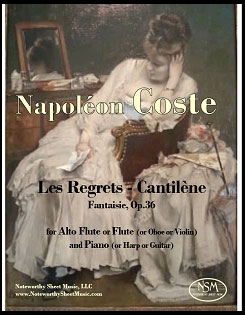 Les Regrets-Cantilène, Op.36, by Napoléon Coste
Les Regrets-Cantilène, Op.36, by Napoléon Coste
Transcribed for Alto Flute or Flute (or Oboe or Violin) and Piano (or Harp or Guitar) by C.A.Vater
Score, Alto Flute Part, and alternative Flute (or Oboe or Violin) Part, PDF $5.99
Napoléon Coste (1805-1883) became famous not only as a guitar soloist, but also as a major composer of some 60 works, most of which were written for guitar. His music is in the romantic French style and appreciated for its originality. His Fantaisie, Op.36, Les Regrets-Cantilène, is a short, single-movement piece written for oboe or violin with piano or harp or guitar. We created our Noteworthy Sheet Music edition from the difficult-to-read manuscript version in the public domain, available on imslp.org. We include a score in concert pitch and a part suitable for flute, oboe or violin, as well as a part transcribed for alto flute in G. The piece falls nicely within the sweet range of the alto flute and our transposition sounds appealing and completely natural on that instrument. In fact, Les Regrets-Cantilène is gorgeous on either flute or alto flute. Melodic and sentimental, the work is not overly demanding technically and should appeal to players of a moderate or higher skill level.
Score, 4 pages; Alto Flute part, 1 page; Flute (or Oboe or Violin) part, 1 page; Total 8 pages.
PreviewDanzi - Grande Sonate - Piano & Basset Horn
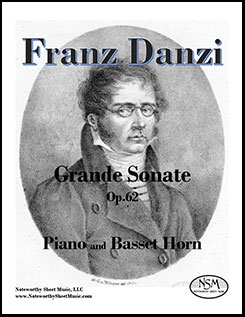 Grande Sonate, Op.62, by Franz Danzi
Grande Sonate, Op.62, by Franz Danzi
for Piano and Basset Horn; re-notated, edited, and with occasional ossia elaborations suggested by John W. Pratt
Piano Score and Basset Horn Part, PDF $13.99
Franz Danzi (1763-1826) was an active musician, cellist, and teacher in Mannheim, Munich, Stuttgart, and Karlsruhe. A prolific composer, especially of music for the stage and chamber music from keyboard solos to sextets, he revered Mozart and mentored Weber. His wind quintets are notable. His Grande Sonate, Opus 62, for piano and basset horn, was published about 1823, along with an alternative cello part which sometimes differs from the basset horn part in other ways than octave transposition. // The original publication of Danzi’s Opus 62 is available at imslp.org., but there is no full score and the parts are hard to play from, or sometimes even to read at all, lack measure numbers, have a few errors, and differ in the number of measures in the last two movements. We have therefore prepared a full score including the basset horn in concert pitch, to facilitate checking the fit of the basset horn and piano lines and our transcriptions for other instruments against the original. — excerpted from John Pratt’s foreword to the edition
Piano Score, 28 pages; Basset Horn part, 7 pages; Total 40 pages.
Preview